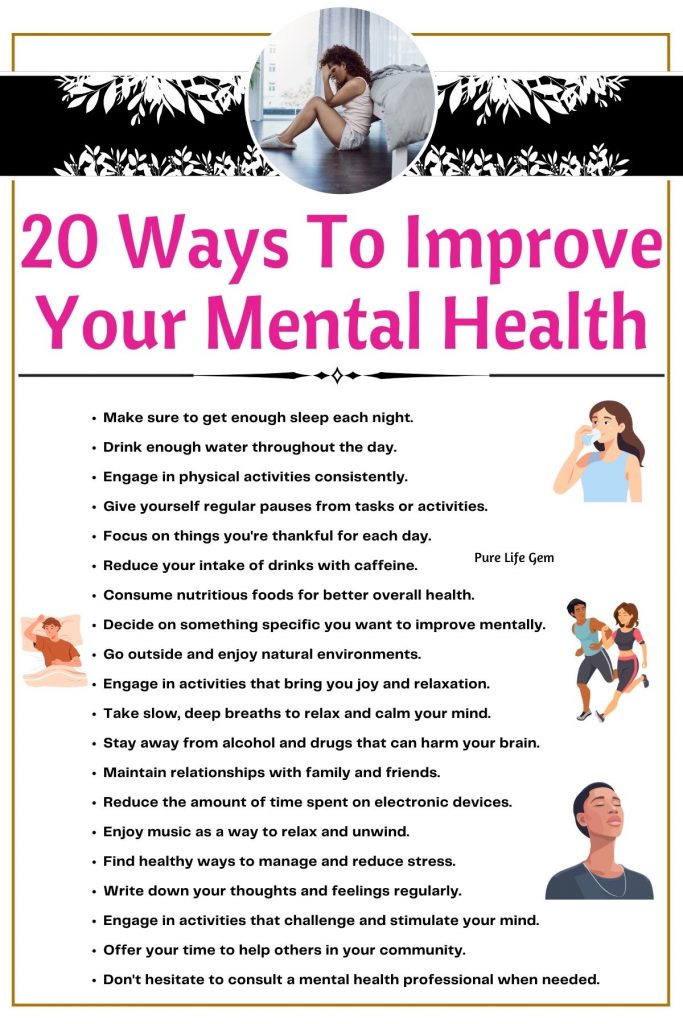It’s easy to neglect your mental well-being in the hustle of daily life, but making an effort to improve your mental health can have a significant impact on your happiness and quality of life. Just as you maintain your body, your mind also needs care too. This guide will show you 20 simple and effective ways to boost your mental well-being.
These tips are simple and can fit into your daily routine without much effort. Whether you are feeling stressed, sad, or just want to improve your mood, these tips can help. They are easy to follow and don’t need any special skills or a lot of time to start seeing benefits.
If you’re looking for quick fixes or long-term solutions, there’s something here for everyone. Let’s dive in and discover how you can take control of your mental health and lead a happier, healthier life.

20 Ways To Improve Your Mental Health

1. Get Enough Sleep
Getting enough sleep is an effective way to improve your mental health. Sleep helps your brain rest and recover, making you feel more alert and focused during the day. It also helps reduce stress and anxiety, leading to a calmer mind. Good sleep can improve your mood, making you happier and more positive.
When you don’t get enough sleep, it can affect your mood, memory, and ability to concentrate. Aim for 7-9 hours of sleep each night to support your mental well-being and health. So, make sure to prioritize sleep for a healthier mind.
2. Stay Hydrated
Staying hydrated is important for your body, including your brain. Drinking enough water helps your brain work better, improving your mood, focus, and memory. Dehydration can lead to headaches, fatigue, and mood changes, which can affect your mental well-being. So, aim to drink several glasses of water throughout the day to support your mental well-being and stay healthy.

3. Exercise Regularly
Exercise regularly is when you move your body regularly, like going for walks or doing yoga. It can help improve your mental health by making you feel happier and less stressed. Engaging in physical activity causes your brain to release endorphins, that make you feel good. It also helps you sleep better, increase your self-esteem, and boost your energy levels.
Regular exercise can reduce symptoms of anxiety, depression, and other mental health disorders. So, by moving your body regularly, you can improve your mood and mental well-being.
4. Take Breaks
By allowing your body and mind to unwind and recharge, taking pauses can help you achieve better mental health. When you feel overwhelmed or stressed, taking a break can help reset your mind and improve your focus and productivity when you return to work.
It lets you get away from a stressful circumstance and provides you with time to relax and do something you enjoy or simply rest. Taking regular breaks can also help prevent burnout and promote well-being. So remember, don’t forget to take breaks throughout your day to keep your mind healthy and happy.

5. Practice Gratitude
Practicing gratitude means focusing on the good things in your life and being thankful for them. This can help your mental health because it shifts your focus away from negative thoughts and emotions. When you are grateful, you are more likely to feel positive emotions like happiness and contentment.
It helps you appreciate what you have instead of focusing on what you don’t have. Taking time to acknowledge and appreciate the good things in your life can help you cope with challenges and stress. Try writing down three things you are grateful for each day to start practicing gratitude.
6. Limit Caffeine
Limiting caffeine can improve your mental health because excessive caffeine consumption can lead to symptoms like anxiety, restlessness, and insomnia. By reducing your intake, you can help manage these symptoms and promote better mental well-being.
It’s important to pay attention to how much caffeine you consume and consider cutting back if you notice negative effects on your mental health. So, remember that everyone is different, it’s best to listen to your body and find the right balance of caffeine for you.

7. Eat Healthily
Eating healthily is an effective way to improve your mental health. Nutritious foods provide your brain with the vitamins and minerals it needs to function well. Eating fruits, vegetables, whole grains, and lean proteins can improve your mood and energy.
Healthy eating can also reduce stress and anxiety, helping you feel more balanced and positive. By choosing healthy foods, you support both your body and mind.
8. Set A Mental Health Goal
Setting a mental health goal is like having a plan to make yourself feel better. It gives you a clear focus on what you want to achieve, like feeling less stressed or more confident. By having a goal, you can track your progress and see improvements over time.
It also helps you stay motivated and accountable for taking steps to improve your mental health. Setting a mental health goal is an effective way to work towards feeling better and happier. Begin with a small, manageable goal and work your way up to it. This approach can lead to lasting improvements in your overall well-being.

9. Spend Time In Nature
Spending time in nature can help improve mental health because it allows you to relax and reduce stress. Being in nature can lower anxiety and boost your mood. It gives you a break from the hustle of everyday life and helps you feel more calm and refreshed.
Even a short walk in a park or sitting outside can make a big difference. Enjoying fresh air and natural surroundings supports your mental well-being and health. So, make sure to get outside and enjoy the benefits that nature can provide for your mental health.
10. Do Something You Love
Doing something you love is an effective way to improve your mental health. Engaging in activities that bring you joy can distract you from negative thoughts and emotions, allowing you to focus on the present moment. It promotes relaxation and joy.
Whether it’s reading, painting, playing sports, or dancing, making time for things you enjoy can greatly enhance your well-being and mental health. So, to help enhance your mental health, discover something you love to do and make regular time for it.

Related Posts
11. Practice Deep Breathing
Deep breathing is a simple yet effective way to improve your mental health. When you practice deep breathing, you take slow, deep breaths that help to calm your mind and body. It slows your heart rate and lowers blood pressure, making you feel more relaxed. Take some quiet, deep breaths through your nose and out of your mouth for a few minutes each day.
This simple technique can quickly improve your mood and help you manage anxiety. You can also concentrate better and think more clearly by deep breathing. Incorporating deep breathing exercises into your daily routine can have a positive impact on your mental well-being.
12. Avoid Alcohol And Drugs
Avoiding alcohol and drugs can improve your mental health by allowing your brain to function at its best. Alcohol and drugs can impact your mood, memory, and decision-making abilities. Staying away from alcohol and drugs helps you maintain a clear mind and better emotional balance. It also supports your physical health, which in turn benefits your mental well-being. By avoiding alcohol and drugs, you can enhance your quality of life and mental health.

13. Connect With Loved Ones
Connecting with loved ones is an effective way to improve your mental health. Spending time with family and friends provides emotional support and reduces feelings of loneliness and isolation. Sharing your thoughts and feelings with a friend or family member can help you feel better and improve your mood.
Whether it’s talking, sharing a meal, or doing activities together, staying connected helps you feel more supported and valued, enhancing your well-being. So, make sure to stay connected with your loved ones regularly to take care of your mental health.
14. Limit Screen Time
Limiting screen time can improve your mental health by reducing exposure to harmful content, such as negative news or social media comparing. Too much time on phones, computers, or TVs can increase stress and disrupt sleep. Reducing screen time helps you focus on real-life interactions and activities, boosting your mood and reducing anxiety.
Try setting specific times to be away from screens and engage in other activities like reading, exercising, and singing. This balance can enhance your mental well-being and health.

15. Listen To Music
Listening to music can be an effective way to improve your mental health. Music has the power to uplift your mood, reduce stress, and help you relax. It can also aid in expressing emotions and fostering a stronger sense of connection with others. Whether it’s calming tunes to unwind or upbeat songs to boost your energy, finding the right music can make a big difference in how you feel.
By listening to music that you enjoy, you can improve your well-being and feel better mentally. So next time you’re feeling down, try putting on some music and see how it can help improve your mood.
16. Keep Stress Under Control
Keeping stress under control is an effective way to improve mental health because stress can negatively impact your thoughts, emotions, and behaviors. By managing stress through techniques like deep breathing, exercise, and mindfulness, you can reduce the feeling of anxiety and overwhelm.
This can help improve your mood, boost your energy levels, and enhance your well-being. In this way, keeping stress under control can lead to a more positive mental state and better mental health. Finding healthy ways to cope with stress, such as talking to a friend or practicing a hobby, can make a big difference in maintaining your mental health.

17. Try Journaling
Journaling is a way to express your thoughts and feelings on paper. It can help you organize your thoughts, clarify your feelings, and reduce stress. By writing down your emotions and experiences, you can gain a better understanding of yourself. This can improve your mental health by providing a release for negative emotions and promoting self-reflection. Try journaling as a daily practice to see improvements in your mental well-being.
18. Learn Something New
Learning something new is an effective way to improve your mental health. Engaging in activities that challenge your mind, such as learning a new skill or hobby, can enhance cognitive function and boost self-esteem. It stimulates curiosity and creativity, leading to a sense of accomplishment and satisfaction.
Whether it’s learning a language, taking up a musical instrument, or exploring a new subject, continuous learning keeps your brain active and promotes mental well-being. It can also distract you from negative thoughts and feelings, helping you feel more positive and engaged. So, trying to learn something new can be a great way to take care of your mental well-being!

19. Volunteer
Volunteering can be an effective way to improve your mental health by giving you a sense of purpose, boosting your mood, reducing feelings of isolation, increasing feelings of happiness, and reducing stress. When you help others, you also help yourself by feeling more connected to your community and building self-esteem.
Whether it’s assisting at a local shelter, mentoring youth, or participating in community events, giving your time and skills can have positive effects on your mental health and happiness. So, consider volunteering as a way to improve your mental health and make a positive impact on the world.
20. Seek Professional Help
Seeking professional help is a good way to improve your mental health. A professional therapist or counselor can help you understand your thoughts and feelings better. They can also provide you with techniques and information for handling tension and worry. Talking to a professional can help you gain a new perspective and learn healthy ways to cope with your emotions. Don’t be afraid to seek help if you’re struggling – it’s a positive step towards feeling better.
Conclusion
By incorporating these 20 effective ways into your daily routine, you can improve your mental health and live a happier, more fulfilling life. Remember to exercise, seek support when needed, and practice gratitude to keep your mind healthy and strong. Start implementing these strategies today and enjoy the benefits of a healthier mind. Remember, your mental health matters, so make it a priority.








These are all such great ideas! Thanks for sharing!
You’re welcome! Thanks for reading!
I do many of these but never thought about setting specific mental health goals. Thank you for sharing!
Jill – Doused in Pink
Setting mental health goals can make such a positive difference. Thank you for your kind words!